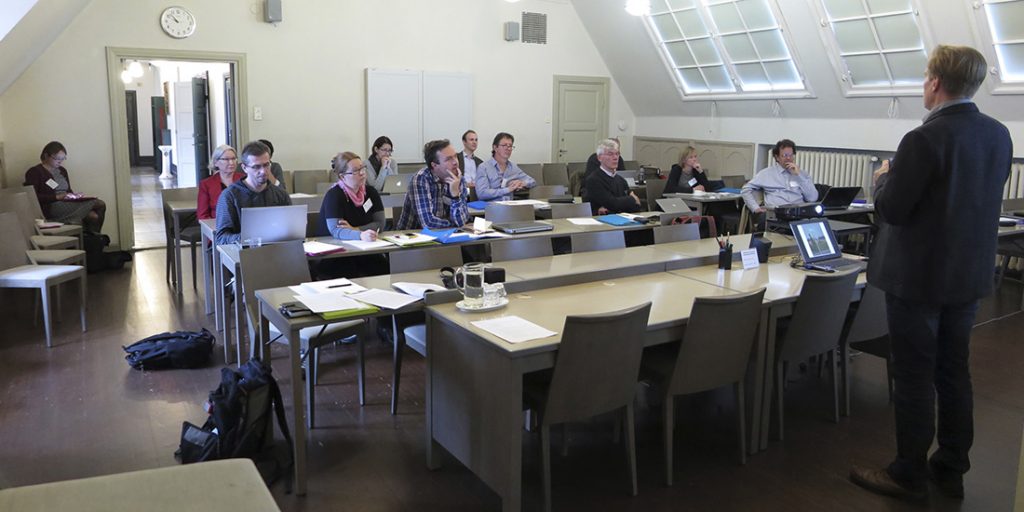
Finnish Society of Forest Science hosted the International Workshop on Forest Science Publishing on 15-16 October 2015 in Helsinki. The event was the first activity of the new IUFRO Working Party 9.01.06 on forest science publishing. The workshop gathered editors of forest science journals and scientists interested in publishing from Europe, North America, and Australia. Editors of scientific journals – especially those published by learned societies and other small publishers – have rarely opportunities to discuss about their editorial challenges and the workshop participants welcomed the opportunity opened by the new IUFRO Working Party.

Participants of the Workshop listening the keynote talk by Professor Mikko Mönkkönen, University of Jyväskylä, Finland, on the challenges and innovative solutions to scientific peer-review.
Open science, quality control, and multidisciplinary research
Workshop presentations and discussions identified three
major challenges for forest science journals: multidisciplinary research,
quality control, and open science.
Forest sciences have a long tradition of interdisciplinary and
multidisciplinary research because practical forestry requires knowledge on
several fields of science and engineering. Forest science journals deal, thus,
with quite different fields of sciences making them unattractive for
specialised researchers. Consequently, journals in the “forestry” category of
Web of Knowledge publish only 21 % of forest-related research articles –
exactly the same percentage as the journals in “ecology” category. On the other
hand, forest science journals are prepared to receive the increasing number of
multidisciplinary research articles on forests if they succeed to market
themselves to the potential authors.
Scientific quality control that is mostly implemented through the peer-review
process, in which knowledgeable scientists confidentially evaluate their peers’
manuscript before publication, is saturating because of the rapid increase in
manuscript submissions. Many journals experience an increasing number of
refusals for their calls for review. Multidisciplinary nature of forest
research poses additional challenges for the review process as the manuscripts
may combine quite different scientific approaches. The workshop discussed
solutions like reviewing manuscripts before submission to a named journal,
stricter control before sending manuscripts to a full review, and open review,
in which manuscripts are evaluated after posting to an electronic journal.
Open access is now suffering from side effects of the transition phase, like
predatory journals that charge publishing fees from authors but have a very
vague review system, if any. However, open access will become main stream as
many important public funding agencies support it strongly. The workshop
discussed more about open data. Opening of all research data is not yet common
in forest sciences but it may be required in the near future. Forest journals
should respond to this challenge by creating common guidelines for requirements
and archiving of open data.
Education for early-career scientists
The editors gathered in the workshop also organised an open half-day session on scientific publishing for Finnish doctoral students and post-docs in forest and environmental sciences. The event gathered about 50 young scientists to listen four presentations by experienced editors and posing questions to the editors present in the workshop. Education of early-career scientists was also identified as a priority activity for the IUFRO Working Party on forest science publishing.
The aim of the seminar was to provide an overview on the publishing process for authors and deal with some key issues on scientific writing. The speakers were editors of leading forest science journals. Although the seminar emphasised forest sciences, many of the publishing issues are common to several academic disciplines. Thus, doctoral students and post-doc scientists of many natural resource, biological, and environmental sciences and their supervisors attended the seminar.
The keynote speaker was Dr Pierre Bernier who has served in several editorial duties of Canadian Journal of Forest Research, the last five years as the Editor-in-Chief. He gave an overview of the manuscript review process from the editors’ point of view. The other speakers were Prof. Johanna Witzell, Editor-in-Chief of Scandinavian Journal of Forest Research, Dr Pekka Nygren, Associate Editor of Silva Fennica, and Dr Sari Palmroth, Managing Editor of Tree Physiology. The seminar was chaired by Dr Erwin Dreyer, Editor-in-Chief of Annals of Forest Science. Abstracts of the seminar presentations are included in the Proceedings of the International Workshop on Forest Science Publishing.
Programme
8:30 – 8:35 Opening, Dr Erwin Dreyer, Annals of Forest Science
8:35 – 9:30 Scientific publication viewed from the Editor’s chair, Dr Pierre Bernier, Canadian Journal of Forest Research
Dr Bernier gave an overview on the review and publication process of your manuscript as seen by an editor of a scientific journal.
9:30 – 10:00 Selecting the right journal for a manuscript, Prof. Johanna Witzell, Scandinavian Journal of Forest Research
Prof. Witzell dealt with key issues of selecting the correct journal for your manuscript and gives some practical advice.
10:00 – 10:30 Coffee break
10:30 – 11:00 Reproducibility in forest sciences, Dr Pekka Nygren, Silva Fennica
Dr Nygren talked about writing the Materials and Methods and Results sections of your article in a way that makes it possible to reproduce your work – a necessary condition for advancement of scientific knowledge.
11:00 – 11:30 Respond to peer review in the spirit of helpfulness, Dr Sari Palmroth, Tree Physiology
Dr Palmroth spoke on efficiently responding to the reviewers’ and editors’ comments on your manuscript.
11:30 – 12:00 Questions and answers
The speakers and other journal editors gathered to the IUFRO Working Party meeting were available for responding the questions of the audience about scientific publishing.
Read the Workshop proceedings.
